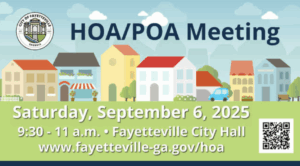A panel of local and statewide educators presented their viewpoints about the Common Core State Standards (CCSS) at a June 10 community forum held at the Sams Auditorium in Fayetteville. As for the educational standards in place in state schools, there are teachers and parents advocating for the measures on both sides of the issue. Panelists during the meeting also responded to audience questions.
The Common Core State Standards in math and English language arts is currently being implemented in Georgia’s public schools. CCSS was adopted by the Georgia State Board of Education in 2010, with classroom implementation beginning during last school year. Common Core was devised in cooperation with the National Governors Association and the Council of Chief State School Officers and is being implemented in 43 states.
The June 10 panel included Ga. School Board Association representative Angela Palm, Kedron Elementary School Principal Julie Turner, Fayetteville Elementary School Principal Kim Herron, state school Superintendent John Barge, Concerned Women of America state director Tanya Ditty, American Principles Project Senior Fellow Jane Robbins and Cobb County Board of Education member Kathleen Angelucci.
Sponsored by Take Action for Public Education and the Fayette County Issues Tea Party, the forum was moderated by Clayton State University President Tim Hynes.
Robbins in commenting on CCSS said it is essentially a workforce development model that people having been trying to accomplish for decades. It is one that is intended to train people for their role in the economy, Robbins said.
“Common Core was not developed by the states but rather by a Washington, D.C.-based non-profit called Achieve, Inc., under the auspices of the National Governors Association and the Council of Chief State School Officers. Neither NGA nor CCSSO, which are merely trade associations with private membership lists, had a grant of legislative authority from the states to develop national standards,” Robbins said.
Barge in his comments took a different approach.
“There has been a lot of talk about Common Core, a lot of information and misinformation and people pro and con,” Barge said. “The standards were initially designed with Georgia at the table. The Ga. Performance Standards are a reflection of Common Core with some adjustments. I think some (aspects) of Common Core need to be changed and we reserve the right to do so.”
Barge said he will be sending a letter to Washington, D.C., to state that position, adding that if adjustments are needed after one year the state will make the necessary adjustments.
Robbins in comments later in the forum questioned whether Georgia has the ability to change the Common Core assessments (tests).
Barge, again in a later statement, said assessments are separate from Common Core, adding that he has major concerns with the assessments. One of those concerns is the cost, which would balloon to $56 million for math and English language arts compared to the $25 million for all subject areas today.
Herron in her comments spoke about the curriculum and the decision-making engaged by teachers in the classroom.
“We look at the standards as a guide for educators,” she said.
Turner agreed, saying, “The standards provide us with goals. Fayette tweaked the goals further after getting them from the state. I see our kids rising to meet the bar.”
The principles of math and writing do not change, Palm responded in support of Common Core.
“I think the feds have overstepped in many areas, but not in this area,” Palm said.
Ditty in her response disagreed, saying she believed the standards in math will slow the pace down and students will be left behind.
Responding to a question about parents being unable to question the curriculum, Barge said in many cases it is a teacher or a school that is misguided on matters pertaining to the curriculum.
“We need to make sure we’re communicating better with (local education) leaders,” he said. “Curriculum is still left up to the local school, so teachers and parents still have a voice.”
Turner toward the end of the meeting said that while the school system does not control the standards, “We do control how we teach them.”
So what is the future of Common Core? While that remains to be seen, there is the potential for legislative action in the next session of the Georgia General Assembly that could alter the educational landscape. Either way, said Barge, it is unfortunate that the standards are being politicized.
“Teachers are tired of being jerked around. Let them teach,” Barge said.











Leave a Comment
You must be logged in to post a comment.